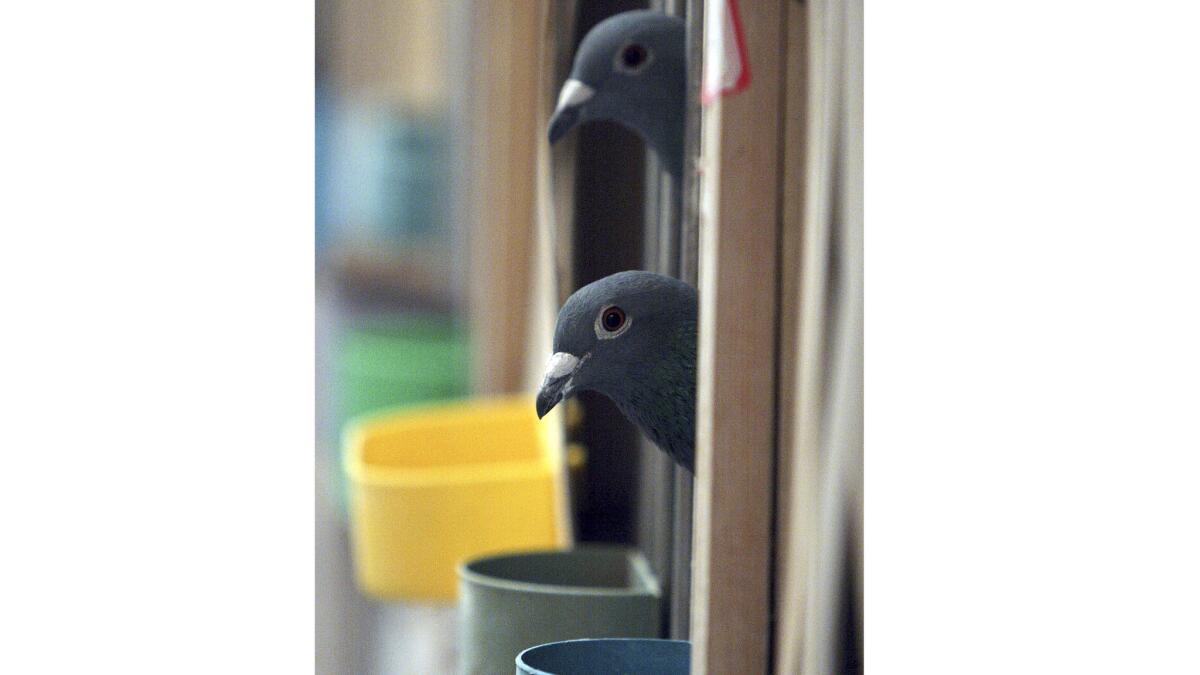When air is polluted, homing pigeons find their way home faster

Homing pigeons at a homing pigeon farm in Chengdu of Sichuan province, China. A new study finds that the birds fly home faster when the skies are polluted.
Homing pigeons are bred for their navigation skills. They find their way along a mental map of signs and smells, using the sun and the Earth’s geomagnetic field as a biological compass to find their way back to their roost.
But what happens if pollution makes the air so hazy that some of these senses get disrupted?
You might expect them to fly more slowly or get lost more often, but scientists at UCLA were shocked to find that the opposite was true: Despite a thick layer of air pollution, racing pigeons on the North China Plain actually flew faster on days when the air quality was worse.
“We all thought it would hurt their lungs,” said Dan Blumstein, who studies the intersection of behavior and conservation biology at UCLA. “We feel the result is robust … but we don’t really know why.”
Researchers Zhongqui Li of Nanjing University and Franck Courchamp of the University of Paris, both visitors at Blumstein’s lab, led the study, which was published this week in Scientific Reports.
Air pollution is a health concern for humans and birds alike. In birds, it’s been known to cause liver and lung damage from exposure to heavy metals and fine particles. It also interferes with flight and navigation ability.
In a country known for its dirty air, the North China Plain stands out. During the study period, the air quality readings soared as high as 482, on a scale in which 500 is the worst.
Join the conversation on Facebook >>
Li and the other researchers wanted to see how air pollution affected pigeons’ homing performance, which could help them understand more broadly how pollution affects bird behavior.
They analyzed the results of 415 pigeon races flown in various weather and environmental conditions. A number of factors affected homing speeds, including beeline distance, wind direction and weather conditions.
Pigeons flew fastest when given a boost from a tailwind on sunny days, the researchers found.
But the air quality changed the race in a way they didn’t expect.
The researchers developed a statistical model that allowed them to look at the effect air quality had on the time it took the pigeons to find their way home, after controlling for the other factors.
According to the model, pigeons increase their homing speed from about 35 mph on clear days to about 42 mph on days with an air quality index of 500. That’s an increase of about 20%.
The scientists aren’t sure why this happens, but they proposed three theories to explain their unusual finding.
It’s possible the birds were just scared. In hazier air, the pigeons may feel more vulnerable to predators because they can’t see as well.
Or, since the particulate matter is known to strain pigeon hearts, it’s possible that the birds are able to sense the poor air quality. That triggers a “rapid escape” response.
“They feel physically threatened by the pollution and they want to escape that,” Blumstein said. “Whenever animals feel exposed, they may wish to get home sooner.”
Another theory is based on the fact that smell is a key mechanism in pigeons’ ability to find home. Perhaps the pollution allows the birds to create a richer olfactory map, with more opportunities to associate certain smells with certain locations. The type and strength of the smells can help them figure out where they are.
“Smells can be used in the same way that sights and sounds can be used to figure out where home is,” Blumstein said. “If it’s a really stinky day and you live near the dump, then you know where home is.”
To explain the results, the researchers will need to do further experiments, Blumstein said.
Ideally, some racing pigeons could be outfitted with GPS trackers to provide better data on true homing behavior. The trackers could show if the pigeons are stopping less or flying faster, Blumstein said.
Also, by selectively blocking certain pigeon senses, the researchers could better understand how the animals perceive polluted air.
For example, they could plug the birds’ noses and see if it takes them longer to fly home. If so, that would suggest they use a richer olfactory map instead of relying more on another sense.
Follow me on Twitter @seangreene89
MORE SCIENCE NEWS
Dance of the dinosaurs? Strange gouges hint at bird-like mating rituals
Your Neanderthal DNA may help you fight disease, and give you allergies
Unlucky Tasmanian devils suffer not one, but two kinds of transmissible cancer




